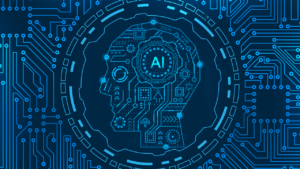“Are you prepared to meet your robot overlords,” asks Tia Ghose. “The idea of superintelligent machines may sound like the plot of ‘The Terminator’ or ‘The Matrix,’ but many experts say the idea isn’t far-fetched. Some even think the singularity – the point at which artificial intelligence can match, and then overtake, human smarts – might happen in just 16 years.” [“Intelligent Robots Will Overtake Humans by 2100,” Discovery News, 8 May 2013] Roger Berkowitz, the Academic Director of the Hannah Arendt Center for Politics, isn’t certain about whether the singularity will ever be achieved; but, he writes: “The point is that if machines act ‘as if’ they are human, or if they are capable of doing what humans do better than humans, we will gradually and continually allow machines to take over more and more of the basic human activities that make up our world.” [“The Humanity of Robots,” The Arendt Center, 18 October 2012] If you find this thought frightening, you are not alone. For a fuller discussion on that point, read my post entitled Artificial Intelligence: Is there Peril in Deep Learning?
Lord Martin Rees, co-founder of the Centre for the Study of the Existential Risk at Cambridge University (which was the subject of the post mentioned above), believes “we should ensure that robots remain as no more than ‘idiot savants’ – lacking the capacity to outwit us, even though they may greatly surpass us in the ability to calculate and process information.” [“Will robots take over the world?” Phys.org, 30 July 2013] Berkowitz is actually as much concerned about how humans are going to behave in the future as he is about how robots are going to behave. He writes:
“Undoubtedly one reason machines are acting more human is that humans themselves are acting less so. As we interact more and more with machines, we begin to act predictably, repetitively, and less surprisingly. There is a convergence at foot, and it is the dehumanization of human beings as much as the humanization of robots that should be worrying us.”
Kathleen Richardson, an anthropologist of robots has a view similar to Berkowitz’. She told Phys.org that we are only afraid of intelligent robots because we know how cruel mankind can be to one another. She explains:
“To understand what underscores these fears, we need to understand science and technology as having a particular and exclusionary kind of mimesis. Mimesis is the way we copy and imitate. In creating artificial intelligence machines and robots we are copying the human. Part of what we copy is related to the psychic world of the maker, and then the maker is copying ideas, techniques and practices into the machine that are given by the cultural spirit (the science, technology, and life) of the moment. All these factors are fused together in the making of artificial intelligence and robots. So we have to ask why it is also so frightening to make this copy? Not all fear a robotic uprising; many people welcome machine intelligence and see it as wonderful opportunity to create a new life. So to understand why some fear and some embrace you really have to know what models of mimesis go into the making of robots.”
Alex Knapp believes that all of the talk about intelligent robots, the singularity, and computer overlords is interesting, but he isn’t worried. Right now, he notes, robots aren’t even smart enough to be middle managers, let alone world-domineering overlords. “There’s no existing computer or robotic system capable of doing the job of a manager at the present time,” he writes. “And it’s pretty unlikely that artificial intelligence will have advanced to the point of replacing the role of manager in … the next 20 years, either. The technology just isn’t there. Still, it’s an interesting intellectual exercise, so let’s proceed on that basis.” [“Why Robots Would Make Lousy Middle Managers,” Forbes, 31 December 2012] Ernest Davis, a computer scientist at New York University, agrees with Knapp that any discussion about intelligent robots must, for the moment, be theoretical. He told Ghose, “”I don’t see any sign that we’re close to a singularity.”
Ghose believes that another reason that people fear the rise of intelligent robots is that “we’re barreling toward a future that doesn’t take people into account.” She points out, for example, that driverless vehicles may make our roads and highways safer, but they will also put millions of truck drivers, taxi and limousine operators, and bus drivers out of work. The same is true concerning robots that are taking over jobs on factory floors. Robert Atkinson, President of the Information Technology and Innovation Foundation, however, believes that such concerns are more myth than reality. [“Robots Are Not The Enemy,” Manufacturing.net, 12 September 2013] He writes:
“It has become a popular meme that ‘robots are destroying our jobs.’ How else do we explain today’s persistent high unemployment? While scores of pundits and analysts have made this claim in the last couple of years, perhaps no one has done more to popularize this theory than MIT scholars Erik Brynjolfsson and Andrew McAfee, authors of the widely cited e-book, Race Against The Machine. They argue workers are, ‘losing the race against the machine, a fact reflected in today’s employment statistics.’ To drive their thesis home, Brynjolfsson and McAfee point to the fact that after WWII productivity and employment lines increased in tandem, but beginning in 2000, the lines diverged, productivity continued to rise robustly but employment suddenly wilted. Aha, ipso facto. Here’s the problem, they claim.”
Atkinson, however, believes that the “notion that technology, automation and productivity lead to fewer jobs and higher unemployment is simply wrong.” He asserts that “there is no logical relationship between job growth and productivity.” Concerning the worry about robots taking over jobs, Atkinson writes that “second order effects that must be considered when evaluating the true impact of technology on jobs.” He points to an OECD study that stated:
“Historically, the income-generating effects of new technologies have proved more powerful than the labor-displacing effects: technological progress has been accompanied not only by higher output and productivity, but also by higher overall employment.”
He dismisses the argument that things are different this time around (i.e., history is not going to repeat itself). He continues:
“This time is actually not different. New innovations being introduced will largely boost productivity in information-based functions or routinized functions, but not jobs that involve interacting with people (e.g., nursing homes, police and fire) or doing non-routine physical tasks (e.g., construction or janitorial services). In addition, new technological growth will create new industries and business models that will promote economic and job growth across the board. The reality is that, far from being doomed by an excess of technology, we are actually at risk of being held back from too little innovation. … Rather than fearing technology we actually need a lot more of it. So bring on the robots, now!”
As with most debates, you can find a bit a truth on both sides. We certainly know that robots are taking over a lot of blue collar jobs. Factory floors will never again look like those manned by our fathers and grandfathers. We also know that new technologies help create new jobs. Whether enough new jobs will be created to keep a burgeoning world population fully employed is certainly a serious question. The rise of intelligent robots will also affect workers who, to date, believed their skills couldn’t be mimicked by machine. The Economist reports:
“Two things are clear. The first is that smart machines are evolving at breakneck speed. … The second is that intelligent machines have reached a new social frontier: knowledge workers are now in the eye of the storm, much as stocking-weavers were in the days of Ned Ludd, the original Luddite.” [“The age of smart machines,” 25 May 2013]
Far from being concerned, however, The Economist concludes: “If we manage them well, smart machines will free us, not enslave us.”




